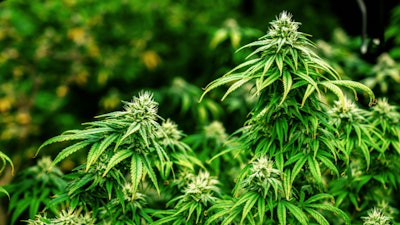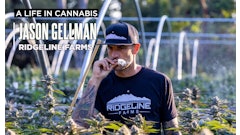
Serena Wong, senior director at cannabis data platform LeafLink, joined the company in 2022. She was driven by the opportunity to use her background and technology to unlock the industry's potential and help cannabis brands and retailers solve their business problems.

Wong said her outspokenness and willingness to take risks sometimes clashed with the mindset of her strict Chinese immigrant parents. When she was approached about joining the cannabis industry, she was "apprehensive and curious." But, in digging deeper into the sector, she identified a career path and opportunities to succeed.
Here, Wong describes her background and journey into the cannabis space, the importance of increasing Asian American and Pacific Islander (AAPI) diversity within the industry, and more.
Andriana Ruscitto: What attracted you to work in the cannabis industry and become a senior director at LeafLink?
Serena Wong: I've been increasingly health-conscious over the last decade–exploring alternative medicines like acupuncture, traditional Chinese medicine, and ayurveda to treat my anxiety and improve [my] overall well-being. I believe cannabis is another natural remedy [with] tremendous healing properties, and I want to be part of the movement to help change negative perceptions, enable legal access, and normalize the plant as another tool for people to positively use for their mental and physical needs.
My personality traits of being outspoken and taking risks can, at times, be at odds with my strict Chinese immigrant parents who subscribe to the philosophy of "not rocking the boat." When a recruiter contacted me about LeafLink, I was equal parts apprehensive and curious. Rarely do we witness new economies emerge, and I had been following cannabis legalization over the years. At this time, I had been in corporate America with Fortune 100 companies my entire career, and while I was seeking a change, pivoting to cannabis tech was not necessarily on my radar. However, as I dug deeper, learning about the needs and pain points of cannabis brands and retailers, [I] identified clear opportunities to leverage my background and use technology to solve their business problems (similar to that of any industry) and to be part of a cornerstone company that is a significant partner for the ecosystem—I knew LeafLink was where I could have the most impact.
AR: What's your perspective on the importance of increasing AAPI diversity in the cannabis space?
SW: The importance is two-fold. First, there is a long-standing stigma and fear of the cannabis plant in Asian communities due to its illegality and positioning as a harmful drug (like the DARE program from the Reagan administration). The more we can increase AAPI representation in the industry across any function and business size (including those that are ancillary, non-plant-touching), the better we can band our voices and resources to facilitate interactions to educate, normalize and encourage acceptance within our communities, and the country at-large.
Second, while AAPI is often perceived as a monolithic group, we are, in fact, a diverse and complex collection of people with varying cultures and experiences. As the cannabis industry evolves, it is critical to have AAPI diversity representing the unique preferences (and even biology) of our segment to curate more relevant products to increase user adoption. For example, I am particularly excited by the recent release of TSUMo Snacks. This commercial and nonprofit partnership with Asian Americans for Cannabis Education, to utilize familiar flavors like lychee, spicy cheesy ramen, etc., demonstrates the culturally relevant cross-pollution applications that can be made between cannabis and AAPI cultures.
Beyond AAPI-centric products and services, AAPI (and female) diversity in senior management is essential for a nascent industry like cannabis to incorporate a kaleidoscope of leadership experiences early in their DNA to accelerate innovation, promote a growth mindset, and build stronger customer relationships for their organizations.
AR: How does the cannabis industry address diversity and inclusivity, particularly concerning the AAPI community? What work still needs to be done?
SW: The groundswell of AAPI founders and thought leaders creating cannabis products, services, media, and community programming has been remarkable. You will find healthy competition but also high degrees of co-creation and openness to share best practices, failures, and creative problem-solving.
There is also a meaningful opportunity to continue advancing the industry with technology solutions. Cannabis has historically attracted creatives and makers, but we can unlock the ecosystem with STEM (science, technology, engineering and mathematics) talent and services across different use cases: improve cultivation to be more cost-efficient and sustainable; streamline procurement-to-payment workflows between businesses; automate compliance and oversight; and improve customer shopping and buying experiences. I am proud to be part of LeafLink, serving the supply chain needs that enable the growth of AAPI-founded brands like STIIIZY, Grizzly Peak and Leune.
Join us this year at the Paris Las Vegas Hotel & Casino for Cannabis Conference, the leading education and expo event for plant-touching businesses.


























